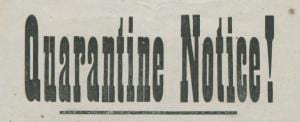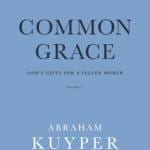Just what will the effects of COVID-19 be on the Evangelical church? The short answer is, I don’t know. But I have a couple of predictions–which is probably too broad a word. More accurate than ‘prediction’ might be ‘mildly-informed guesses’. So take these for what they’re worth.

Prediction 1: The number of attendees in Evangelical churches will drop steeply when the lockdown is over as the nominal and cultural Christians (well, ‘Christians’) peel off after realizing how little they actually like going to church. I think this will be a good thing. Don’t get me wrong: cultural Christianity certainly has its benefits. I live in a place where it is still going strong, and as a parent of small children I appreciate that I can walk down the street with them and not really worry about what sorts of things they might be exposed to. I know this is passing everywhere, but it’s passing more slowly in my particular corner of the world. So although I’m going to miss some of the better aspects of cultural Christianity, the church as a whole will be healthier as more and more unbelievers leave the ranks.
Prediction 2: As the number of attendees in most Evangelical churches declines, a handful of churches here and there will see a bump in numbers. Specifically, after however many weeks at home, Evangelicals at at the vast majority of churches will realize just how shallow their worship service is–particularly the music. After all, if the only difference between listening online to Hillsong/Vertical Worship/whatever other contemporary artists are out there and listening to those same songs performed on the stage at your church (and let’s be honest, it is a stage for most Evangelicals these days), if the only difference is the difference between listening to music online and listening to a live concert, well, why not just stay home and listen online instead? Live concerts are fun, but I don’t need to go to one every week. Especially not at the expense of my Sunday morning.
I’d like to say that people will at least miss the corporate prayer and Scripture reading, but frankly if you’re at an Evangelical church that does those with any regularity or preparedness, you’re already in the minority. Sure, the sermon text might get read–but usually not much else. And if there is more than 120 seconds of prayer in your church service you are at an exceptionally prayerful church for the 21st century.
Something similar will happen with preaching. I’ve not seen the numbers yet, but I know many pastors are running analytics to see how long people watch their sermon videos and live streams. I do not expect these numbers to be encouraging. Especially since there is an ocean of substantive, quality preaching at our fingertips–which I’m assuming at least some Evangelicals are taking advantage of. It is going to be a challenge to go back to whatever shallow, ‘relevant,’ preaching is common in the church these days having spent a month or more listening to John Piper, Alistair Begg, Sinclair Ferguson, or Mark Dever (just to list a few that have been heard in the Neal household over the past month).
Again, I suspect this will just spell the end of church for those who are not really believers. And I’m sure there are few genuine Christians who will wander from church attendance during this time as well. And I’m equally sure that a significant portion will go back to church as normal. But I also think there will be a noticeable slice who start to look for healthier churches. Churches with robust and regular weekly practices–including extended prepared public prayer, congregational singing that actually requires rather than suppresses participation in the pews, and rich expositional preaching that does more than conversationally appeal to the supposed sentiments of ‘what people need right now’ will see their numbers grow.
Or to say this another way, churches that are healthy in both their ecclesiology and in their weekly order of service are going to come out a bit ahead. The vast majority of Evangelical churches which are unhealthy in either their ecclesiology or their order of service or both (with ‘both’ including most contemporary Evangelical churches today) are going to take a big hit.
At least, that’s my prediction. Do what you will with it. I might very well be wrong. One person I talked to before posting this said that they thought it more likely that the cultural Christians would keep going to church, and just treat going back to church as a part of ‘back to normal.’ This person also said that they thought it was unlikely that Evangelicals are listening to Piper, Begg, etc, and that instead they’re listening to shallow performance artists like Steven Furtick, Andy Stanley, or Craig Groeschel, and will simply return to their churches on Sunday morning wanting to double down on the church service as a stage show. I… am afraid this individual might be right. But we’ll see.
With all that said, we finally come to the ‘book review’ portion of the post. This is after all a page dedicated to reviewing media. Fortunately, there is a lot of media out there to help us think well about the church and the health of contemporary church services. So, if you’re looking for somewhere to go to think more about what Sunday morning should look like, here are five books that you should pick up and read–why not start while you’re on lockdown?
- The Rule of Love: How the Local Church Should Reflect God’s Love and Authority by Jonathan Leeman
- Sing! by Keith Getty
- Expositional Preaching by David Helm
- Does God Care How We Worship? by Ligon Duncan
- The Christian Ministry by Charles Bridges
Happy reading, and stay healthy!
Dr. Coyle Neal is co-host of the City of Man Podcast and an Associate Professor of Political Science at Southwest Baptist University in Bolivar, MO













